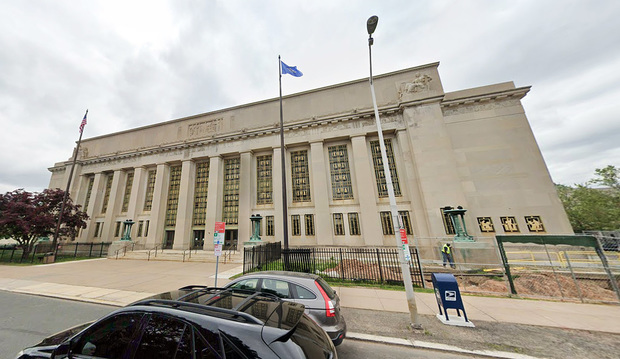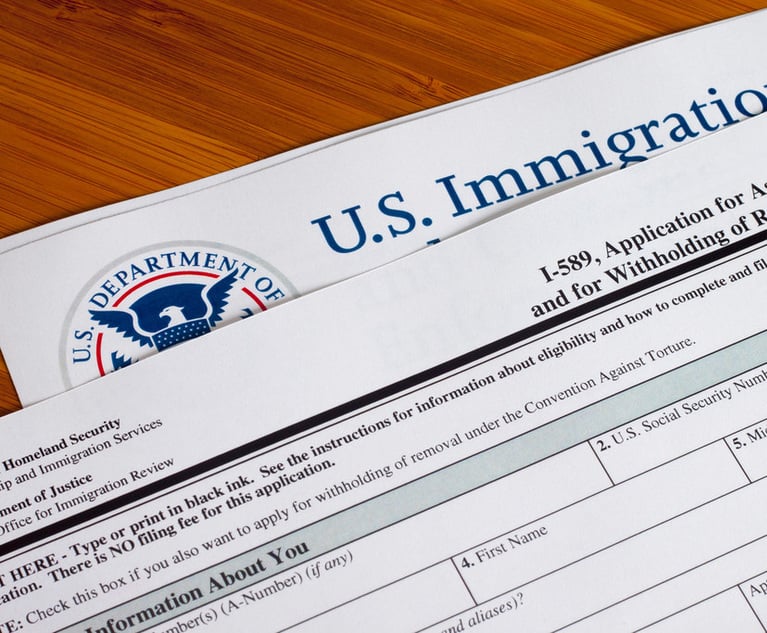Read Connecticut Courts' Latest Updates in Response to COVID-19
On Wednesday, Connecticut's chief court administrator announced the superior courts' latest responses to the coronavirus.
March 18, 2020 at 06:19 PM
3 minute read
 Hartford Superior Court. Photo: Google
Hartford Superior Court. Photo: Google
Less than one week after the Connecticut Judicial District announced sweeping directives to reduced traffic in the state's Superior Court system, and put a hold on jury selections and jury trials due to fears of COVID-19, the chief court administrator announced Wednesday a further reduction of court personnel.
In the directive that Chief Court Administrator Patrick Carroll III issued along with input from Connecticut Supreme Court Chief Justice Richard Robinson. the Judicial District announced several changes that will take effect on Thursday.
They include the following:
• One building in each of the 13 judicial districts will be designated as the location at which Priority 1 business functions will be handled. Those functions include criminal arraignments of defendants held in lieu of bond and all arraignments involving domestic violence cases; juvenile detention hearings; family and civil orders of relief from abuse; and termination of parental rights.
• Juvenile matters will now be heard only in the Hartford and Bridgeport juvenile courthouses.
In the directive, Carroll wrote that he and Robinson "concluded that it is necessary to implement the following unprecedented measures to protect the public, the bar, and our employees."
Carroll, who said most court employees will not come to work, continued: "These are extraordinary times and require extraordinary measures. Our overarching challenge throughout the crisis has been to balance the constitutional obligation of the courts to remain open with protecting the health and safety of every individual who enters a state courthouse. Ultimately, we have determined that the plan announced today is the best option to achieve this balance."
Last week, Connecticut superior courts announced delays of all future jury selections and trials through at least April 13. Juries sitting before the March 13 directive would continue in those trials.
Hartford Superior Court Administrative Judge David Sheridan issued his own directive on March 11.
That directive states that beginning March 13 and until further notice, all pretrial conferences, status conferences and trial management conferences would be conducted over the phone. He also said requests for continuance for up to three months—that are based on legitimate concerns over exposure to the virus—would be "automatically" granted.
Related stories;
Justice Delayed? Lawyers Brace for Impact of 3-Month Continuances Amid Coronavirus Precautions
NYC Criminal Courts Move Arraignments to Video, but Lawyers Will Still Be in Court
NOT FOR REPRINT
© 2025 ALM Global, LLC, All Rights Reserved. Request academic re-use from www.copyright.com. All other uses, submit a request to [email protected]. For more information visit Asset & Logo Licensing.
You Might Like
View All

Trump Administration Faces Legal Challenge Over EO Impacting Federal Workers
3 minute read
Settlement Allows Spouses of U.S. Citizens to Reopen Removal Proceedings
4 minute read
Trending Stories
- 1Uber Files RICO Suit Against Plaintiff-Side Firms Alleging Fraudulent Injury Claims
- 2The Law Firm Disrupted: Scrutinizing the Elephant More Than the Mouse
- 3Inherent Diminished Value Damages Unavailable to 3rd-Party Claimants, Court Says
- 4Pa. Defense Firm Sued by Client Over Ex-Eagles Player's $43.5M Med Mal Win
- 5Losses Mount at Morris Manning, but Departing Ex-Chair Stays Bullish About His Old Firm's Future
Who Got The Work
J. Brugh Lower of Gibbons has entered an appearance for industrial equipment supplier Devco Corporation in a pending trademark infringement lawsuit. The suit, accusing the defendant of selling knock-off Graco products, was filed Dec. 18 in New Jersey District Court by Rivkin Radler on behalf of Graco Inc. and Graco Minnesota. The case, assigned to U.S. District Judge Zahid N. Quraishi, is 3:24-cv-11294, Graco Inc. et al v. Devco Corporation.
Who Got The Work
Rebecca Maller-Stein and Kent A. Yalowitz of Arnold & Porter Kaye Scholer have entered their appearances for Hanaco Venture Capital and its executives, Lior Prosor and David Frankel, in a pending securities lawsuit. The action, filed on Dec. 24 in New York Southern District Court by Zell, Aron & Co. on behalf of Goldeneye Advisors, accuses the defendants of negligently and fraudulently managing the plaintiff's $1 million investment. The case, assigned to U.S. District Judge Vernon S. Broderick, is 1:24-cv-09918, Goldeneye Advisors, LLC v. Hanaco Venture Capital, Ltd. et al.
Who Got The Work
Attorneys from A&O Shearman has stepped in as defense counsel for Toronto-Dominion Bank and other defendants in a pending securities class action. The suit, filed Dec. 11 in New York Southern District Court by Bleichmar Fonti & Auld, accuses the defendants of concealing the bank's 'pervasive' deficiencies in regards to its compliance with the Bank Secrecy Act and the quality of its anti-money laundering controls. The case, assigned to U.S. District Judge Arun Subramanian, is 1:24-cv-09445, Gonzalez v. The Toronto-Dominion Bank et al.
Who Got The Work
Crown Castle International, a Pennsylvania company providing shared communications infrastructure, has turned to Luke D. Wolf of Gordon Rees Scully Mansukhani to fend off a pending breach-of-contract lawsuit. The court action, filed Nov. 25 in Michigan Eastern District Court by Hooper Hathaway PC on behalf of The Town Residences LLC, accuses Crown Castle of failing to transfer approximately $30,000 in utility payments from T-Mobile in breach of a roof-top lease and assignment agreement. The case, assigned to U.S. District Judge Susan K. Declercq, is 2:24-cv-13131, The Town Residences LLC v. T-Mobile US, Inc. et al.
Who Got The Work
Wilfred P. Coronato and Daniel M. Schwartz of McCarter & English have stepped in as defense counsel to Electrolux Home Products Inc. in a pending product liability lawsuit. The court action, filed Nov. 26 in New York Eastern District Court by Poulos Lopiccolo PC and Nagel Rice LLP on behalf of David Stern, alleges that the defendant's refrigerators’ drawers and shelving repeatedly break and fall apart within months after purchase. The case, assigned to U.S. District Judge Joan M. Azrack, is 2:24-cv-08204, Stern v. Electrolux Home Products, Inc.
Featured Firms
Law Offices of Gary Martin Hays & Associates, P.C.
(470) 294-1674
Law Offices of Mark E. Salomone
(857) 444-6468
Smith & Hassler
(713) 739-1250










